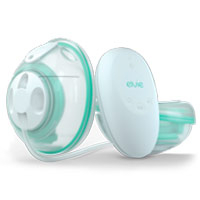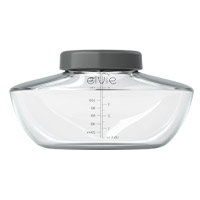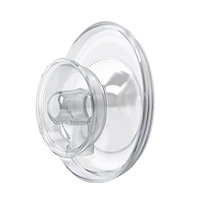Suddenly, you’re responsible for the health and wellbeing of an actual human being — one who’s completely dependent on you for at least the first few years of their life — and your once comparatively serene, independent, and routine-driven existence is turned upside down.
As a woman, the transition from mum-to-be to mum is often paved with as many blissful highs as it is formidable challenges — bonding with your baby can be a uniquely fulfilling experience, but being mother to a little one invariably means having to cope with sleep deprivation, emotional highs and lows, and a struggle to retain your own identity.
Of course, there’s no blueprint for becoming the “perfect” parent — perfection is an unattainable myth, anyway — and it’s nigh-on impossible to feel truly ready for all the ups and downs motherhood has to offer, but it pays to equip yourself with as much knowledge as possible before your little life-transforming bundle of chaos and joy arrives.
Preparing for your first baby? Wondering what to expect as a new mum? Read on as we offer our best advice for adapting to motherhood.
Challenges new mums face
No one who ever brought a child into the world would say it’s a walk in the park. Though your experience as a parent is likely to be punctuated by many euphoric highs (more on those shortly), adapting to caring for a newborn isn’t without profound challenges — from the physical changes your body experiences to the impact of factors like sleep deprivation.
Here are just some of the adversities you’ll likely face as a new mum:
Recovering physically from childbirth. Growing a human inside your body — and then pushing them out of it — is a huge physical undertaking. Or, if you undergo a caesarean, you’ll be dealing with recovery from major surgery. Regardless of your birth type, during your postpartum recovery, you may experience aftereffects such as vaginal bleeding, sore breasts, thinning hair, and a more frequent need to pee.
Adapting to a whole new set of responsibilities. Becoming a mum for the first time can almost literally turn your life upside down — you’ll be forced to adapt to a completely new routine, navigate changes in relationships, and balance caring for a newborn with self-care and other day-to-day responsibilities.
Experiencing emotional ups and downs. Only around 15% of new mothers will experience postpartum depression, but even for those who don’t, hormonal changes often result in fluctuations in mood — you may feel confident and full of ecstasy one minute, and dejected and questioning your own self-worth the next.
Coping with a lack of sleep. Ask any new parent how they’re feeling and their immediate response is likely to be “tired”. Newborns wake frequently in the night to feed — usually around every 2-4 hours — which means your sleep will inevitably be interrupted and you’ll often feel fatigued and drained of energy.
Feeling self-conscious about body changes. While your post-baby body should be seen as a badge of honor considering the monumental feat you’ve just achieved, many new mums feel self-conscious about the way their bodies look after giving birth — their breasts may change size and shape, for example, and stretch marks may appear.
Struggling with a loss of identity. Becoming a mother means taking on a whole new role, and some mums feel their pre-pregnancy identity disappearing — relationships with friends may evolve, for example, and you may have to sacrifice some of the things you loved doing before you became a parent.
The beautiful parts of motherhood
Becoming a new mum isn’t all mood swings and sleepless nights, however — for every obstacle and setback, there are often many more beautiful, life-affirming, and undeniably entertaining moments that make the challenges worth enduring. When it feels like the weight of the universe is on your shoulders, remember — so many aspects of motherhood are filled with joy.
Here are just a few of the wondrous upsides of becoming a mum:
Holding your baby for the first time. There are few moments that will fill you with a sense of emotion and achievement than the first time you hold your baby in your arms. Every ounce of hard work, pain, and anxiety you’ve likely endured will suddenly pale in comparison to the new-found glow you’re feeling.
Building an unbreakable bond. While bonding can be a gradual process and doesn’t happen instantly for everyone, the mutual feeling of attachment that develops between you and your baby is often one of the most rewarding aspects of being a mum. You may come to question whether you’ve ever loved anything as much.
Watching your baby grow and develop. Though it can feel like the early years fly by in an instant, they’re filled with exciting milestones. Of course, some of these (like teething) can be challenging, but many of these moments — such as when they learn to crawl, walk, and say their first words — will fill you with pride and elation.
Experiencing their sense of awe. For a baby discovering the world for the first time, almost every day brings a new adventure. Seeing the amazement in their eyes when they witness something you’d otherwise consider quite unspectacular — their own reflection, for example — can bring joy to everyday moments.
Feeling a renewed purpose. Though some new mums grapple with what they feel is a loss of identity, many thrive on the new sense of purpose being a caregiver can bring. After all, raising a child is the ultimate responsibility, and it can be incredibly fulfilling to nurture, guide, and witness your little one’s development.
Strengthening relationships with others. Many new mothers say that having a baby gives them a new sense of respect and appreciation for their own mother, which often solidifies the mother-daughter bond. Of course, your own mum is often your biggest source of support during your child’s early years, too.
Tips for new mothers: what should every first-time mum know?
As we’ve pointed out, there’s no step-by-step instruction manual that tells you everything you need to do to prepare for having a baby, and no list of advice can be exhaustive or exact since no two mums’ experiences will be identical.
This said, there are some things we feel all new or expectant mothers should know before embarking on this remarkable journey:
Establish a support network
Being a new mum can feel isolating, especially if your partner has returned to work and most of your daily interaction is with a tiny person who can’t speak and spends most of their time sleeping. This is why it’s so important to have a reliable network of people you can call upon any time you need support, advice, or you’re just craving some adult company.
Your support network might include:
Family and friends. Your partner, parents, friends, and other family members can all help in their own ways, from providing you with a much-needed break by taking over responsibilities — whether that’s caregiving or cleaning — to simply being there for a chat when you need it.
Healthcare providers. Qualified professionals such as your midwife, doctor, and doula can provide information and support during and after pregnancy. A lactation consultant can help if you need any breastfeeding-related advice.
Support groups. During pregnancy, antenatal support groups can help prepare you for what childbirth has in store while helping you connect with other expectant parents. After pregnancy, joining a mother and baby group enables you to socialise with other parents and little ones.
Set boundaries with friends and family
When you have a baby, loved ones are often itching to meet the new arrival — it’s an exciting time when a close friend or family member welcomes a new person into the world, and let’s face it, babies are darn cute.
But while you may be glad of the company, welcoming frequent visitors can be draining (for you and your baby, although they’ll likely sleep through many social calls), especially in the first few days as you’re still getting used to your new routine.
Who you allow to visit and when is up to you, and you shouldn’t feel pressured to accept requests from friends and family until you feel good and ready. Of course, it goes without saying that you should discourage visits from anyone who is feeling under the weather, as this could put your baby at risk of illness.
Try not to neglect self-care
Remembering to take good care of yourself as well as your little one is one of many motherhood-related factors that can be filed under “easier said than done” — because when so much of your day is taken up by feeding, changing, washing, and soothing your baby, how can you possibly find a spare few minutes for self-care?
While it’s a difficult balancing act, dedicating even just a few moments each day — when your baby is taking a nap, for instance — to yourself can be hugely beneficial for your mental health and overall wellbeing as you adapt to your new role as a caregiver.
You might engage in some gentle exercise such as yoga, for example, run yourself a hot bath, or simply take an opportunity to put your feet up and watch television or read a book. Though it can feel like it, self-care is never selfish.
For more advice on looking after your own wellbeing, check out our guide to postpartum self-care.
Don’t be afraid to ask for (and accept) help
We may love to romanticise the idea of the mighty, multitasking “supermom”, but no mom should have to go it alone — after all, they say it takes a village to raise a child.
This said, some mums can feel reluctant to admit they need help, fearing this makes them a failure or reflects an inability to juggle the challenges of caring for a baby. This couldn’t be further from the truth, however — there’s absolutely no shame in either accepting help when it’s offered or asking for support when things are getting a little too much.
Remember your support network. If you have a partner, communicate openly about how you’re feeling — are there other ways they can support you? Reach out to your family and friends, even if it’s just for a chat about anything not involving dirty nappies. And if you need some more professional advice, make an appointment with your doctor or health worker.
Trust your instincts
As a new mum, it’s inevitable that parenting “advice” will come from all angles — your friends, close family members, and even occasional strangers will likely all have their own ideas about what’s best for you and your baby.
But while most of this advice will be well-intentioned, the fact that someone else has “been there and done it” doesn’t mean their way is the right way. Everyone’s experience of parenthood is different, and what worked for someone else may not work for you.
You should always heed the guidance of healthcare professionals, of course, but don’t be afraid to take every piece of unsolicited advice with a grain of salt. You’ll discover what works and what doesn’t, and sometimes (no matter what anyone else says) you need to do what you feel is right.
Go easy on yourself
Let’s make no bones about it; birthing and raising a baby is hard. Rewarding and filled with moments of pure pleasure, of course, but undeniably hard. On any given day, it’s not unusual to experience anxiety, stress, self-doubt, and disorientation — sometimes all at the same time.
But it’s vital to set realistic (and flexible) expectations. Don’t put pressure on yourself to get it right first time — you almost never will; parenting is often a game of trial-and-error — and expel the word “perfection” from your vocabulary, because striving for the p-word will only lead to disappointment.
Accept that there will be ups and downs, and moments where you feel like you’ve “cracked it” followed by new, unforeseen challenges that force you to reevaluate everything! But if you’re doing your best, you’re doing a great job.
Remember: there’s no such thing as the perfect mum, and a big part of being a parent is learning and adapting as you go. There’s no shame in accepting support, but you should also feel empowered to trust your instincts — after all, only you can truly know what’s best for you and your baby.











 11 minute read
11 minute read